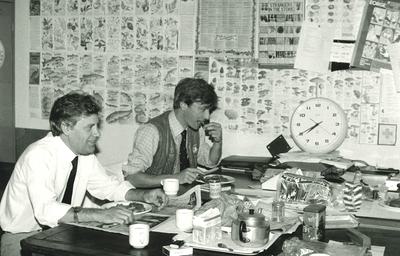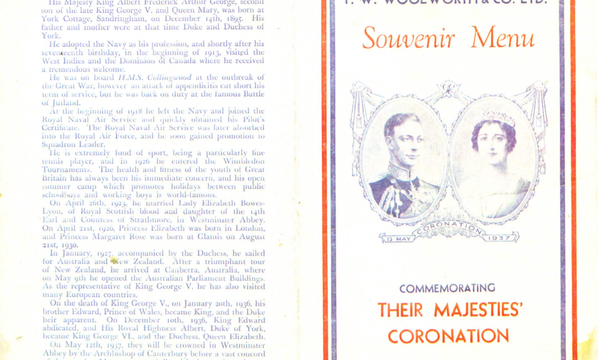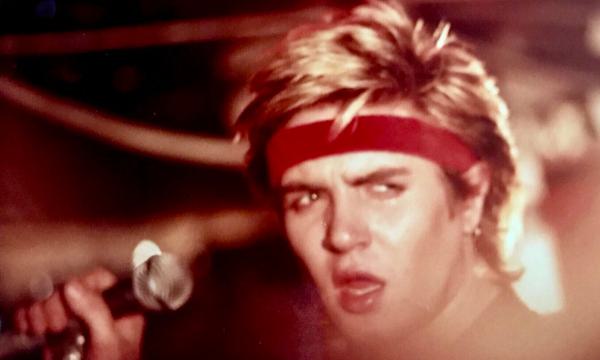News Story

As part of ongoing research at Birmingham Museums Trust, we are exploring and analysing our oral history collection. These oral histories capture personal life stories, offering a unique glimpse into the everyday lives of ordinary people.
In this series, we explore food and drink in Birmingham, focusing on ten stories from 1984. We hope you enjoy this fascinating journey through the flavours and culinary traditions of the city's past!
To listen to the short story snippets see below or click on the name to jump to that section:
- Doris Evans - Generational differences
- Dorrie Dawes - Description of Princess Cafe
- Vera Owens – Mum’s cooking
- Arnold Tranter – Loss of skills
- Diana Braggs - Cross cultural learning
- Una Davis – Availability of ingredients
- Lil Stephens – The importance of school dinners
- Rhoda Evans – War time growing
- Lily Johnson - Cow heel broth
- John Baker - Birmingham food identity
1. Doris Evans - Generational differences
For Doris, it is clear the king rib is a new arrival on the food scene. In the 1980s, convenience food was really taking off, with the rise of freezers and microwaves making this possible. Doris discusses the differences in the eating of convenience foods between the older and younger generations - what differences do you notice between you and your parents' eating habits?
Doris Evans Transcript
Doris Evans: But I've seen a great change in the eating habits as the youngsters have come. They don't like proper dinner. What I'd call proper dinner.
Peter Jenkinson: So, what do you call a proper dinner?
Doris Evans: Well, I call proper dinner boiled potatoes, and the roast potatoes, sprouts, peas, [coli] you know two veg and if it's beef, Yorkshire, if it's lamb, onion sauce, mint sauce. If it's pork, stuffing and applesauce, which is what they have now, but it's the older ones I've got a lot of old, people who've been a donkey's years who really have that dinner. The younger ones have king rib and chips and peas. I personally have never tasted one.
Peter Jenkinson: Whats king rib?
Doris Evans: Well, its like a beef burger and it's long instead of round. I think it's pork, I've never tasted one it's frozen. You see where we made everything ourselves. We now have had to come to buying beef burgers and King rib, oh and pizzas. But they don't-- its just the youngsters you know and chicken curry.
Peter Jenkinson: Do you put those on because the young ones have asked for them?
Doris Evans: That’s-- yes, oh, yes. Never put it on like-- until about three years ago, they'd never had a curry and they kept—ohh I had a lovely curry last night went so and so, do us one, so I done one, and I do it occasionally. But the older ones [groans] you know, they weren't happy. But there's always a choice the menu.
2. Dorrie Dawes - Description of Princess Cafe
Dorrie Dawes reminisces on the Princess Cafe in Temple Street, and the Palais dancehall in Ladywood. This dancehall was one of the earliest jazz clubs in the UK, opening in 1920. Dorrie remembers in vivid detail the decor and ambiance of the cafe - how has this changed in contemporary cafes? Do you think the decline of traditional social activities, such as afternoon tea dances, has impacted the way communities interact and bond today?
ID: R0434 2:14 - 4:44
Dorrie Dawes Transcript
Peter Jenkinson: What about things like ice cream, and cakes?
Dorrie Dawes: Oh yes, very popular, especially afternoon like and afternoon tea and cakes. It used to be a thing. Now I remember in Temple Street. There was a cafe there called the Princess cafe. Now it was over at [Gent Outfitters]. I believe it was called Rowins, the Gent Outfitters and this place was upstairs. And it was absolutely gorgeous. They used to have a trio playing, you know, and all the tables were immaculately laid with beautiful pink tablecloths, and there used to be these three tier cake stands that they used to bring to each table, and lovely silver tea pots and everything. And the place used to be absolutely full every afternoon. It was sort of an in place of that era, where everyone used to go for afternoon tea you know and all the bits of scandal and gossip. And I believe that a cake, they used to have all these lovely big cream puffs and chocolate eclairs and everything you know, a cake used to cost about a shilling! Which was a hell of alot of money but it was because you were playing for the decor and the band and everything, it was beautiful. I'm sure if they opened one today it’d do marvellous because all that went by the board with the afternoon tea dances, there used to be afternoon tea dances I mean my mother used to take me to them. Up Ladywood, funnily enough there used to be place there, a dance hall up there called the Palais and in the afternoon, you know she used to sit me on the balcony with ice cream and a glass of pop and say don't tell your father where you've been and they all used to dance-- all in long dresses, and it used to be full. All that's gone you know, it's all plastic places with plastic people and flashing lights and you can't hear yourself talk or anything now can you?
3. Vera Owens – Mum’s cooking
Vera Owens talks about how her mother always managed to feed her family, using up leftovers in ‘rotten dinners’ on Sundays. These savvy practices may have been leftover from the war and rationing. Vera also mentions going to local fruit shops and butcheries to get ingredients. Does this still exist in the same way today? why/why not?
(ID R0437 - 2:12 - 4:25)
Vera Owens Transcript
Vera Owens: My mum, she was, she was one that she always did stews, right? She, well, she, she didn't have any money sort of thing. But she always made a meal. And I honestly say that we never ever went hungry because she used to do these stews and I can tell you exactly what we used to get. We used to go to these butchers in Broad Street. And I think it was only about threepence in our money. That was three pennies. And you get these pork bones right? That was one day and then we used to go to this, there was a big fruit shop down King Edwards Road. I know we always went there, big veg and fruit and get loads of vegetables, you know, because even, as I say, they wasn't very enlightened in those days were there. But she always did loads of vegetables. And now all these big stews, they still stick in my mind because I still do stew myself and dumplings right. That was one day a week and we always had toast for our breakfast and porridge, always porridge, I don’t think it was made with milk. We used to have condensed milk or treacle on. The treacle, we used to go to this shop in Broad Street, an old-fashioned shop, and take a basin and used to, you know, I think probably cost a tuppence something like that. And used to take it out of the thing, right? Fill the basin up and we used to have that on the porridge. And we always had, no Monday, we always had what we called oh rotten dinners, you know, because it was sort of the leftovers right? From Sunday.
4. Arnold Tranter – Loss of skills
Arnold Tranter talks about not having the skills and knowledge to handle cheaper cuts of meat. Do you think there are skills being lost over time? How could we preserve some of these skills?
(R0459 01:58 - 03:13)
Arnold Tranter Transcript
Karen Hull: So you don't have an educational role as much?
Arnold Tranter: Quite a lot I find myself being approached by the younger generation for advice because having been in the area for so long, word has got around that I am a butcher, and I pride myself in being such and therefore I am able to advise the younger ones if necessary, as which is the applicable cut to what they're preparing. Unless they bring like, we do get instances where they bring the actual cookery book.
Karen Hull: So if somebody came to you and said look, I'm I'm very hard up. I have very little money but I want some meat what would you advise them to buy today?
Arnold Tranter: Well I would still advise them to buy the cheaper cuts as long as they're prepared to cook them in the proper manner. The time limit is still another big factor in the housewives life today. There are so many things involved that the housewife no longer stays home cooks and feeds the kids and watches and irons, she's also a money earn a wage earner, so time is limited. You see, and therefore they should - the cheaper cuts have gradually faded out because they just haven't got time or the knowledge to handle them.
5. Diana Braggs - Cross cultural learning
Diana Braggs talks about cross-cultural learning, learning from Birmingham residents about how to cook British dishes. For people arriving in the UK, food is an important way of expressing identity and understanding a new culture. If someone would arrive in the UK now, what would you teach them how to cook?
(ID R0480 03:17 - 04:18)
Diana Braggs Transcript
Peter Jenkinson: What was the idea behind the cookery group then?
Diana Braggs: We we started a group here for Asian women. And we discovered that their interests were also in cookery, besides craft and needlework and learning more about the Western habits and things
Peter Jenkinson: And did you find the cookery was a very popular option to do?
Diana Braggs: Yes, it was quite popular then you know, because quite a number of the women were mothers and they wanted to learn how to make biscuits, cakes. And they also wanted to know about the fish fingers because the children kept saying what they had at school dinners [laughter] and that's how our cookery group started.
Peter Jenkinson: So from doing the sort of traditional Asian cookery, you then passed on to English cooking.
Diana Braggs: Yes, yes.
Peter Jenkinson: And what sort of things did you learn? Teach cooking them?
Diana Braggs: Well, we-- you mean I-- what did I teach them yeah? We did sponge cakes. We did oat biscuits. They were mostly [sweets] you know, not really meals.
Peter Jenkinson: So very sort of sweet things and snacks?
Diana Braggs: Yes, most of them are sweets and snacks.
6. Una Davis – Availability of ingredients
Una Davis talks about the difficulty of finding West Indies ingredients when she arrived in Birmingham in 1962. How far do you have to travel to get the ingredients you need, at an affordable price?
(R0481 - 0:24 - 03:41)
Una Davis Transcript
Una Davis: When I came to Birmingham, we found that with regard to West Indian food, there wasn't an awful lot then there wasn't a large variety as there are now. I suppose this was due to erm sort of transport, you know, air trafficking sort of more speedily now than they used to be were 20 years ago. So erm, we in general eats a lot of West Indian food and I myself, I enjoy other food from other countries. I enjoy the Asian food, French cooking and the English food typical of Yorkshire roast beef and Yorkshire pudding, which is my favourite English dish. It is it is interesting uhm, when one is able to, uhm, sample different food from different countries, and for me personally, it makes it more enjoyable because I enjoy cooking anyway, and at home I do not do a typical West Indian. I do not eat have a typical West Indian dish dish normally. On Sundays would have the normal traditional West Indian, rice and peas or curry with rice, but during the weekdays I might have an English dish, I may have an Asian dish just depending on how I feel at the time, yes. There are a wider selection of West Indian food now on the market we differ slightly from with regard food from the Asian because we have things like yam and the sweet potatoes and you just, whereby you'll find the Asians they will prepare a meal with yam in it. I'm not too sure about the sweet potatoes. West Indians eat an awful lot of rice, more so than the I'll say Irish potatoes because in the West Indies you've got to differentiate the difference between sweet potatoes and Irish potatoes ok (laughs) because I think there's about 3 or 4 variety of potatoes in the West Indies. West Indian food on the whole, I think it's it's quite expensive. Just like the Asian food because it won't intend eating West Indian food seven days a week, it's costing them a small fortune yeah. And of course, you do find that West Indian children on a whole, I think they enjoy the English meals. So you'll find that mum will be sort of cooking a typical West Indies West Indian dish for her husband and English food for the children. That happens a lot yes.
7. Lil Stephens – The importance of school dinners
Lil Stephens testifies the importance of school meals on children’s development. How important do you think school meals are for ensuring that children receive proper nutrition, especially in areas with high unemployment or low incomes?
(ID R0492 - 0:41 - 1:50)
Lil Stephens Transcript
Peter Jenkinson: How important do you think school meals are for feeding children generally?
Lil Stephens: Well, I think the school meals now are more important than they ever were. They were needed mostly in the old days, but now, with the unemployment and people on very low incomes, then the school meals is a very important part. If you go to some of the poorer areas of Birmingham, see the children arrive for school, you'll realise they’ve had no breakfast, and you can always tell at dinner time who are the hungry ones, they're there waiting for seconds and thirds, if they’re going. Its most important part is school meals in the system of today. How long we can keep on? I don't know with lady Thatcher, but it's something I think that the people of Britain must demand that they keep. With mothers out of work, and they're having to go to work to supplement the income, then the children are left around the street, or perhaps go and get a sandwich up the milk bar or something. Then school meals is the most important part. It don't only feed them, it teaches them how to eat. The ladies have a role to play in teaching children how to behave at the dinner table, and I think that's a message that also gets through from the school meals ladies.
8. Rhoda Evans – War time growing
Rhoda Evans discusses growing food on top of an air raid shelter in her garden and keeping rabbits, to supplement her familys’ food ration. Are you able to grow your own fruit, vegetables or herbs at home?
(ID R0495 1:10 - 2:39)
Rhoda Evans Transcript
Rhoda Evans: He made a garden like that with the bricks and filled it up with dirt. And he, he planted that. And I tell you what, we never went without. It was fresh mint and things to make it a bit better, and a bit of parsley and that. And I grew a tomato, a little pixie tomato, tomatoes till Christmas under on the air raid shelter top, and herbs and things on the no the summer shelter. It was a concrete top, and they had a hole down there. And we put, used to put few herbs or things. And I grew this tomatoes, all little, tiny tomatoes on there, and we got a little bit at the side, you got with chives or something in there, and and then what else did we have? Rabbits. We kept rabbits. Two rabbits. They were pets for the kiddie, but they killed them and ate them for Christmas. And ducks,
Peter Jenkinson: Who killed them?
Rhoda Evans: Dad and Tom never forgive him. I didn’t.
9. Lily Johnson - Cow heel broth
Lily talks about drinking the fat in cow heels broth, known as dripping, and is scolded by her mother for taking some of the ‘goodness’ away from her father. How have our understandings of fats and health changed over time, and what role does fat play in a healthy diet today?
(ID: R0411 - 01:20 - 03:38)
Lily Johnson Transcript
Karen Hull: How was cow heel cooked?
Lily Johnson: In a great big pot. It's a cow's hoof as you know. But the way it's all it's all dressed of course first, but its raw, and all that is on it, theres no meat at all but it's all jelly. It's gristle. Boiled. Till its all jelly. My dad loved it.
One winter's night, I was sent for dads cow heel. We had a can, and on the top was a cup, where you could either take a can full of tea to dad, see and he’d use it as a cup and drink it. But mainly it was for cow heel. And the lady used to get a fork, that'll just about get that in, you know and she pressed it down and then the ladle you had so much broth. So it was a bitter winter night. And going down Abbey Street from Lodge Road down Abbey street into Park Road. I sat on the lady's doorstep and I thought it is lovely oh warming me hands. And then the idea came to me well, I wonder if I could have a drop a broth. Why not? So I poured a drop of broth into the lid, sipped it, oh and it was great, oh I thought this is lovely. But I must hurry up, dad must have his cow heel. So back home I went. And mum said what's that down your coat Lil? I looked, and the fat from the cow heel, where I'd tipped it see, not being very steady, had spotted down me coat. and it was dripping. Do you know solid cold dripping. And she says you've been at your dad's cow heel, now, don't do it again. Because I’ll send you to bed and she says you'll have nothing. [So] I’ll stop you going to pictures Saturday afternoon. Don't do that again. You leave it for your dad. He wants a goodness as well as you. And I never touched it after. I was tempted to but I thought no this bloomin coat [laughter].
10. John Baker - Birmingham food identity
Many foods we used to eat have slowly fallen out of popular taste over time, as discussed by John Baker. Certain dishes were once tied to specific regions, such as tripe and bread pudding in Birmingham and cow's udder in the Black Country. Do you think we still have regional food variation? Why/why not?
(ID: R0419 - 03:30 - 04:59)
John Baker Transcript
Karen Hull: Is there any particular food that you associate with Birmingham? That was served in those days?
John Baker: Yes, everybody in all these cafes used to have bread pudding, great big slabs of it. You know, we used to make it with a lot of dried fruit and of course it always had to be nice and crispy. Tripe was always very popular, used to be a lot of tripe shops. And they always used to sell udder, cows udder, seemed to do it in the Black Country a lot.
Peter Jenkinson: And how would that have been served?
John Baker: Which?
Peter Jenkinson: The tripe.
John Baker: The tripe, same as you do tripe and onions. You know how you do that? Oh. Well you get your tripe, you cut it up into pieces about two by one inch, as it were. And you want about a pound of onions to a pound of tripe, at least. You just wash it, you know, bring it to a boil, scald the water, put your tripe in, onions, pepper, salt, and boil it until it's tender. It would take you about 20 minutes in a pressure cooker, and it would take you about three hours in a pan. And then you thicken with milk, flour, so on.
Karen Hull: Do you eat it with a fork?
John Baker: Oh yes. It’s very nice, you'd never get any indigestion from it at all. It's wonderful food.
by Sophie Beckett,
Public Health Research Officer.


